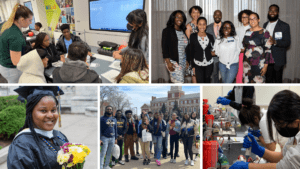
Maryland Stem Cell Research Fund Supports Innovative Women Researchers, Part 2
The Maryland Stem Cell Research Fund (MSCRF) is a champion for women in stem cell research. A host of women-led labs have received MSCRF support in pursuit of ground-breaking research in a wide-range of areas, including fields as diverse as blood brain barrier modeling, tissue engineering, autism, and rare disease therapeutics, among others.
This is Part Two (read Part One here) of our MSCRF series highlighting some of the brilliant women leaders performing remarkable research with support from the fund.
Dr. Hilary Vernon, Johns Hopkins University School of Medicine
Vernon is an Associate Professor of Pediatrics with the McKusick Nathans Institute of Genetic Medicine. Her research focus is on a rare disease called Barth Syndrome, which impacts about 200-300 people globally. Individuals with Barth Syndrome have a mutation in their tafazzin gene, which is involved in lipid metabolism. An abnormal phospholipid called cardiolipin accumulates on the inner mitochondrial membrane and results in symptoms such as heart disease (an enlarged heart) and immune deficiency.
Vernon’s lab is exploring how the genetic defects that cause Barth Syndrome lead to mitochondrial dysfunction or abnormalities in energy production in affected cells.
“The MSCRF has had a great impact on our research because it provided funding and to build our foundational model that allows us to study cells that are affected in Barth Syndrome like cardiomyocytes and cells that are not such as neurons. In this way we are comparing two types of cells where one cell is affected by the disease whereas the other kind of cell is not,” stated Vernon.
“We are hoping to be able to manipulate affected cells to correct the phospholipid defects and make them healthier. We are hoping to improve the cardiac function of individuals with Barth Syndrome so they can have a longer and healthier life,” she added.
Dr. Valina Dawson, Johns Hopkins University School of Medicine
Dawson is a Professor of Neurology and the Director of the Neuroregeneration and Stem Cell Programs at the Institute for Cell Engineering. Her research is focused on Parkinson’s disease (PD), which is the second most common neurodegenerative disease. The incidence of PD is accelerating, making it even more important to find better treatments to stall or stop the disease in its tracks.
Her lab is working to understand why brain cells deteriorate and if there is a way to stop this degeneration. In addition, the team is hoping to identify biomarkers that could predict whether an individual will develop PD.
“I am very grateful to the MSCRF’s support because it has sparked new discoveries. The fund has provided resources that are critically important to develop new treatments and cures for patients that suffer from neurological diseases and more specifically Parkinson’s,” stated Dawson.
The MSCRF has provided support to a number of Dawson’s lab’s projects including the development of a human cortex organoid model created from stem cells. Another project the lab has focused on recently is studying how the cortex is impacted by COVID-19. Using this model, data showed that brain cells can get infected with SARS-CoV-2, and some of the cells that die are inhibitory neurons that are directly related to the delirium symptoms and brain fog that some experience, with the potential to have longer term neurological impacts. Dawson hopes their work can provide some guidance to the clinic about how to provide care for long COVID patients.
Dr. Kan Cao, University of Maryland College Park
Cao is a Professor/Associate Chair in the Department of Cell Biology and Molecular Genetics. She is also the Founder and Chief Science Officer of a startup called Mblue Labs. Her research team is using stem cells to explore a potential cure for progeria, a rare disease that causes premature aging and death. The average lifespan of Progeria patients is 14 years.
Cao and her team have been investigating the disease mechanisms and potential treatments for progeria. Cao recently co-authored a paper with other scientists such as former NIH director Francis Collins and Harvard professor David Liu showing that gene editing greatly extended the lifespan of a progeria mouse model, suggesting that gene therapy could be a potential option for a future progeria cure.
“The MSCRF has provided the essential funding for us to get started studying disease mechanisms in different tissues and cells. These materials are so rare because the number of progeria patients are so few. We have used the newly developed iPSC research direction to differentiate the iPSCs into the different tissue and cell types to understand the systematic aging in Progeria,” stated Cao.
Dr. Linda Resar, Johns Hopkins University School of Medicine

(Video coming soon)
The Resar Lab at Johns Hopkins University School of Medicine is working on a molecular switch that can control the proliferation of blood cells. The Resar Lab team hopes that by modulating levels of this protein, they can improve healthy cell growth while weakening leukemic cells.
Leukemia is a debilitating blood cancer that can occur in childhood or throughout life and is particularly lethal in older populations. Leukemia is a complicated disease to target because blood cells are constantly turned over, which in turn requires constant regeneration and opportunities for cancer-causing mutations to occur. Chemotherapy is still the primary treatment for this disease.
Previous work from Dr. Linda Resar and her group identified high mobility group A chromatin regulator (HMGA1) as a protein that is highly upregulated in stem cells as they transform into a cancerous state. In work supported by the MSCRF, the team is building upon this previous research by using CRISPR, a relatively new genetic engineering technology, to tune down the expression of HMGA1 in cancerous cells so that they will no longer be able to uncontrollably replicate. Further, the team can also carefully turn up HMGA1 expression in normal stem cells that might have been heavily damaged by chemotherapy and radiation, enhancing their performance and, in turn, healthy cell growth.
If you’d like to learn more about the MSCRF and how it can potentially support your own research, reach out to Dr. Jaishankar and her team at [email protected]. You can also connect with her on LinkedIn and Twitter.
- About the Author
- Latest Posts
Steve brings nearly twenty years of experience in marketing and content creation to the WorkForce Genetics team. He loves writing engaging content and working with partners, companies, and individuals to share their unique stories and showcase their work. Steve holds a BA in English from Providence College and an MA in American Literature from Montclair State University. He lives in Frederick, Maryland with his wife, two sons, and the family dog.




